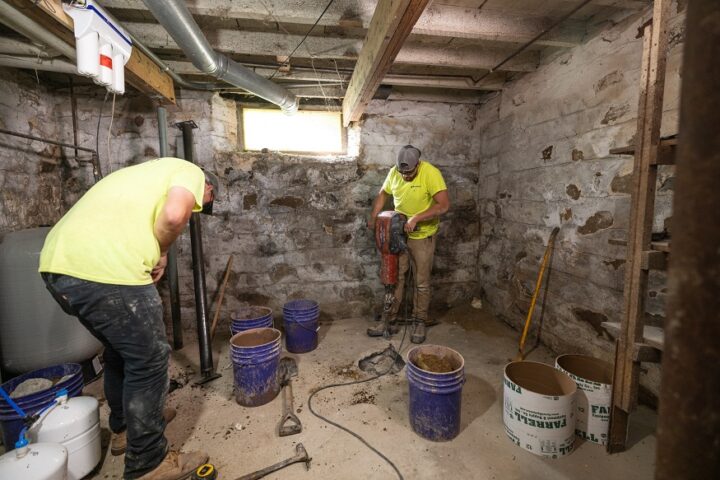Your basement is more than just a place for storage or laundry—it’s a critical part of your home’s foundation and structural integrity. Ignoring it can lead to serious and costly problems. That’s why an annual basement inspection is one of the most effective ways to catch early warning signs before they escalate into major damage.
Whether you’re a new homeowner or have lived in your property for decades, knowing what to look for during a yearly inspection can help you avoid the need for emergency repairs and preserve your home’s value.
Why Annual Inspections Matter
Your home is constantly under pressure—from soil expansion, shifting temperatures, groundwater intrusion, and even your own HVAC system. Over time, these pressures can impact the structural elements of your basement, leading to bowing walls, cracks, and moisture issues. An annual inspection helps identify and address minor damage before it turns into a full-scale basement structural repair in Charlotte, NC.
In areas like Charlotte, where soil composition and seasonal rainfall fluctuate dramatically, early detection is critical to avoid foundation damage and preserve your home’s structural safety.
What to Check During Your Basement Inspection
Here’s a step-by-step breakdown of what to examine during your annual basement check-up:
1. Cracks in Walls and Floors
Hairline cracks are often normal and a result of settling. However, wide or growing cracks, especially those running horizontally or in a stair-step pattern along block walls, are red flags. These can signal movement in the foundation and may require professional evaluation and possibly structural foundation repair.
2. Bowing or Leaning Walls
If your basement walls are curving inward or bulging, it’s a strong indicator of hydrostatic pressure from surrounding soil. This condition is unsafe and requires prompt action. A reliable solution often involves some form of basement wall reinforcement, such as carbon fiber straps or steel I-beams, to stabilize and strengthen the walls.
3. Water Stains and Moisture
Inspect all corners, seams, and floor edges for signs of water intrusion. Discoloration, efflorescence (white powdery residue), and musty odors may indicate leaks or seepage, even if you don’t see standing water. Left unchecked, moisture can weaken concrete, promote mold, and exacerbate existing structural weaknesses.
4. Gaps Around Doors and Windows
Check for any separation between basement doors or window frames and the surrounding walls. These gaps may suggest foundation movement or shifting that’s affecting the basement’s structure.
5. Sagging Beams or Uneven Floors Above
Even if your basement looks fine at eye level, look up at ceiling joists and beams. Any signs of sagging or wood separation could indicate that the structure is under stress. Uneven floors in the living space above are also a subtle but important sign that your basement structure may be compromised.
6. Efficient Drainage and Gutter Systems
Your exterior drainage affects your basement more than you might think. Make sure downspouts are directing water at least 6 feet away from your home, and check that grading slopes away from the foundation. Poor drainage is a major contributor to structural issues in basements.
When to Call in the Pros
If you notice any of the warning signs mentioned above, it’s time to bring in a professional for a structural basement inspection in Charlotte. An expert can assess the extent of damage using tools like laser levels, moisture meters, and foundation maps. They’ll provide a clear picture of what needs to be repaired and how urgently.
Don’t wait for things to worsen—early intervention is more cost-effective than waiting until walls need full replacement or excavation becomes necessary.
Choosing the Right Help
When it comes to serious repairs, it’s essential to work with trusted and experienced basement repair contractors. Look for companies that offer clear diagnostics, warranty-backed solutions, and a portfolio of successful past projects.
If you’re searching online for the best basement repair company near me, prioritize those that specialize in both structural and waterproofing services. A combined approach ensures the root cause is treated—not just the symptoms.
Don’t Wait for Damage—Prevent It
Your home’s foundation is not something to ignore until problems arise. Small structural shifts can escalate quickly under pressure from water, temperature changes, and soil movement. By dedicating just one day each year to a thorough basement inspection—or scheduling a professional evaluation—you can prevent major repairs, protect your investment, and maintain a safe, dry living space.
Think of an annual inspection as a health check for your home. You don’t wait for symptoms to see a doctor—and the same should apply to your foundation. Get ahead of problems before they cost you peace of mind (and thousands in repairs).
Need expert eyes on your basement?Schedule a structural basement inspection in Charlotte today and get professional advice tailored to your home’s unique needs.




